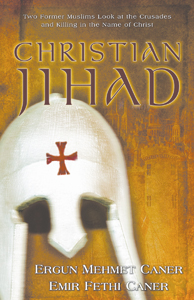Christian Jihad is a lesson in humility. From the Crusades, to the Spanish Inquisition to murderous anti-abortionists, the history of Christianity runs deep with blood.
Christians may well follow the "prince of peace' but as history unfolded little on paper seems to separate us from the followers of Osama Bin Laden. Time and time again Christians have killed "in the name of God'. What went wrong?
This is a key apologetic question for our times.

Ergun and Emir Caner, converts from Islam to Christianity, are well aware of the role the Crusades continue to play in souring relationships between Christians and Muslims. For many Muslims the Crusades were but yesterday.
Protestants do struggle to accept this. Our history of being oppressed under Rome, has led us to perceive ourselves as the "persecuted'.
Writing to an evangelical audience, the Caners are keen to deny wriggle room to Protestants who dismiss their responsibility in Christianity's bloody history. The Reformers " including Luther, Zwingli and Calvin " all advocated killing those who disagreed with them.
Both authors are lecturers in church history at US Baptist Universities, and steeped in "free church' history they tap into facts often overlooked by evangelicals of the reformed-Puritan stream.
Indeed, Baptist and "free church' history is crucial for understanding the development of religious freedom and ideas of liberty in Western thought.
Anabaptist theologian Balthasar Hubmaier, who wrote the tract On Heretics and Those who Burn Them in 1524, was the first to advocate complete religious freedom. He not only argued for religious liberty for dissenting Christians but also for Jews and Muslims whom, he said, "cannot be overcome by our doing, neither by sword nor by fire'. Four years later Hubmaier was burned at the stake by the Roman Catholic Church for his "heresy'.
The book's historical treatment of this issue is extremely helpful in clarifying the difference between religious "tolerance' and religious "liberty'. The authors argue that the European tolerance laws drafted at the end of the Reformation wars of the 17th century (eg the British Act of Tolerance of King William's 1689 Glorious Revolution) mark just the first step in the path towards religious freedom. Thus they argue that recent religious laws in France, Canada and Australia (eg the 2002 Victorian anti-vilification laws) are actually a step backwards to the mere "tolerance' of religious diversity found in the 18th century.
The weakness of this historical focus, however, is the lack of real discussion of the Bible's teaching on the key issues: military service, just war, church and state issues. This seems particularly strange when this history of Christian persecution begins almost before Luke's ink has dried at the end of Acts.
More significantly, it's very hard to judge the views of the various theologians without seeing what the key biblical texts actually say. Christian Jihad defends the "free church' Donatists in their argument with the theologian Augustine (354-430). But it is frustrating to read about the conflict between Augustine (354-430) and the Donatists about their lack of loyalty to the Roman Emperor without knowing which parts of the Bible were being discussed.
The book is an introduction to the issues for lay people, not a scholarly tome. It may well provoke questions that require further investigation. Was Augustine's view on church and state right or wrong? The authors praise his just war theory but criticise his persecution of the Donatists. How should we respond to the thorough pacifism of the early Christian leadership? Their arguments from Scripture that it is "idolatrous' for Christians to swear an oath of allegiance to a pagan government still resonates with some evangelicals today.
We have reached a key moment in history. The secular response to the conflict between militant Islamism and the West does threaten to choke our "liberties' Christian Jihad is a must read for anyone interested in defending religious freedom.























